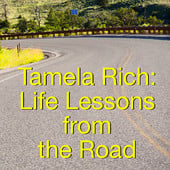 I’ve mentioned how fortunate I’ve been to have so many people take a chance on me. Nadine and Mark were originally friends of a friend, who opened their hearts and home by insisting that Dusty and I layover with them at their farmette outside Portland, Oregon.
I’ve mentioned how fortunate I’ve been to have so many people take a chance on me. Nadine and Mark were originally friends of a friend, who opened their hearts and home by insisting that Dusty and I layover with them at their farmette outside Portland, Oregon.
Besides the horses, mules, turkeys, pea fowl, dogs, a domesticated wolf, cats, chickens, and goats, they also kept a guard llama, Ben.
As a knitter, I coveted his coat, but I knew nothing about the creature’s other merits. I would never have guessed that oddly-shaped llamas are especially effective at protecting other creatures against dogs and coyotes.
Nadine and Mark had the ideal setup for a guard llama, because he was the sole llama and considered the other animals to be “his” herd.
Guard llama on the job
Just as we were loading out, the llama went into his guard mode, stamping and making a sound that I can’t describe (but which you can hear on the podcast — just hit the button). Coyote alert! Mark and Nadine went into fire drill mode: he grabbed a shotgun while she headed for the livestock. I learned that a coyote in broad daylight is rare, and that if the predator came anywhere near the llama he would be trampled and thoroughly stomped, but the threat vanished as quickly as it appeared.
Coyotes are exotic where I’m from in North Carolina, but whenever one is sighted or suspected, the announcement is always shrouded in dread. <Cue the danger music> Coyotes have been seen in the area. Why are they universally vilified? Yes, they might kill your wandering cat or toy poodle, but so will a lot of other things.
The anti-coyote PR machine
I did some research and learned that the Aztec name for the coyote loosely translates to “trickster,” while Navajo sheep and goat herders referred to the coyote as “God’s dog.” Hmm, what did they appreciate about this predator that we don’t?
Turns out, sheep ranchers running large herds of unprotected sheep started the public relations campaign against God’s dog, but I learned that coyotes maintain healthy ecosystems and species diversity by preying on mid-sized predators like foxes, raccoons, opossums and skunks. If people do their part, the coyotes will keep their distance.
I like the approach Mark and Nadine took with species balance — let each critter do its job. As the children’s song says, “All God’s creatures have a place in the choir.”
Sometimes it’s easier to hate what we don’t understand, or don’t fully understand. We too often rely on unexamined stereotypes to make snap judgements and to dismiss people and ideas. I found this dismissive attitude to be prevalent in the very places where diversity of thought is needed to solve important problems and lay the ground for progress.
Today would be a good day to give someone the benefit of a doubt, wouldn’t it? Sometimes I don’t heed my own advice, but I promise I’ll be thinking about it today. Will you?
